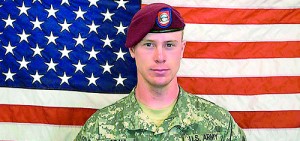Sunday Times 2
Freed hero or traitor?
Comrades recall how Private First Class Bowe Bergdahl had just come off guard duty in the early hours of June 30, 2009, when he approached his team leader with a peculiar question.
If he were to leave their base – a remote U.S. outpost in the mountains of south-eastern Afghanistan – would it be a problem if he took his ‘sensitive’ equipment?

Life imitating art: Private First Class Bowe Bergdahl as a young private and Fictional Sergeant Nicholas Brody, played by actor Damian Lewis in Homeland (inset) (AFP/Reuters)
Having been advised that taking his gun and night vision goggles would certainly be ‘a problem’, the 23-year-old returned to his makeshift barracks and collected his water bottle, digital camera, knife, compass and diary. Then he slipped into the darkness.
When he was nowhere to be found at roll call the following morning, the military launched a major operation to find him before the enemy did.
By the afternoon, intercepted radio messages revealed he was in the hands of the Taliban. Despite a couple of early sightings and a series of internet video appearances, which showed him looking progressively more gaunt and unhealthy, Bergdahl disappeared.
Then, nearly five years after he went missing, the 28-year-old was handed over to special forces troops on the Afghan-Pakistan border and whisked off in a helicopter.
The exchange of the sole U.S. prisoner of war in Afghanistan for five Taliban leaders held at Guantanamo Bay has plunged the Obama administration into a major row over ethics and strategy. It has also sensationally raised another question: just who is the man the U.S. is welcoming back?
The return of a long-missing soldier held by captors as ruthless as the Taliban (or rather a linked group called the Haqqani) would normally be the occasion for universal rejoicing. But Republican politicians and former comrades – until now legally forbidden to discuss Bergdahl in case it jeopardised rescue efforts – say there is nothing to celebrate.
Bergdahl, they claim, was a ‘selfish’ deserter who cost the lives of at least six other U.S. soldiers, who died as the hunt for him took them into dangerous rebel-held areas. Worse, amid considerable evidence that he was sickened by the American military operation, and sympathetic towards Afghans, some insist the U.S. may be welcoming back a traitor. Whatever his motives for leaving his base and walking out of the war, could Bergdahl have been ‘turned’ by the Taliban?
It was becoming increasingly clear why some liken him to the fictional Sergeant Nicholas Brody in the smash-hit TV series Homeland.
Brody, played by British actor Damian Lewis, is a U.S. Marine captured by Al Qaeda in Iraq and gradually converted to the terrorists’ cause. He learns Arabic and becomes a Muslim. In a moment that convinces him he is on the wrong side, a little boy he has befriended is slaughtered in a U.S. air attack.
Rescued by special forces years later, he is welcomed home by an America that little suspects he has a terrorist agenda and plans to assassinate the Vice-President.
While no one seriously suggests Bergdahl is an Islamic assassin, there are striking echoes of the TV drama in his story.
Bergdahl’s father, Bob, has said he will ‘defend his character until the day I die’.
Mr Bergdahl learned Pashto – Afghanistan’s official language – and grew a bushy, Taliban-style beard. He wanted to come across as the sort of man to whom the Taliban might respond when he pleaded for his son’s return.
Even Bergdahl’s devoted parents admit he made for a highly unconventional soldier. They home-schooled the boy, instilling in him their Christian values. Later, he travelled around Europe and applied to join the French Foreign Legion but was turned down, reportedly because recruiters doubted his mental stability. Instead, he joined the U.S. Army, but from the start he kept apart from other soldiers, whom he saw as ill-disciplined and hopeless.
Members of his unit, part of the 501st Parachute Infantry Regiment, say his manner became odder when they reached eastern Afghanistan’s remote Paktika region. ‘He spent more time with the Afghans than he did with his platoon,’ said a comrade.
In letters and emails home, Bergdahl made his disillusionment clear. ‘I feel ashamed to even be American,’ he wrote. ‘The horror of the self-righteous arrogance that they thrive in. It is all revolting.’
In an uncanny echo of Homeland, Bergdahl was particularly affected by seeing an Afghan child fatally run over by a U.S. armoured vehicle.
‘We don’t even care when we hear each other talk about running their children down in the dirt streets with our armoured trucks,’ he complained in a final email sent three days before he disappeared. ‘I am sorry for everything. The horror that is America is disgusting.’
The possibility that Bergdahl might have become more than just an unwilling prisoner started to gain traction after the Taliban put out an early internet video of him wearing a long beard and military uniform, denouncing the U.S. operation and pleading to be released.
Nevertheless, the U.S. Army promoted Bergdahl twice while he was a captive, first to the rank of specialist, before making him up to a sergeant. He is also entitled to his full back pay.
© Daily Mail, London

